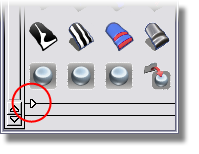Shades the picked surfaces with a color map showing areas in and out of draft, for checking mold manufacturability.
This shading mode shows you which parts of a surface are in-draft and out-of-draft for a specified pull vector and draft angle. In-draft points are shaded blue, out-of-draft points are shaded red. You can also display a tolerance region in pink.
Shade the picked surfaces with a draft angle map
 button in the Diagnostic Shading panel.
button in the Diagnostic Shading panel.

You can create a curve-on-surface along the parting line using Evaluate > Parting Line in the Palette.
in the Palette.
See Create curves on surface from evaluation data for more information.
 tool to create a reference vector, and point it in the direction you want.
tool to create a reference vector, and point it in the direction you want.
The X, Y, and Z coordinates of the vector are automatically set.
Some manufacturing processes, like injection molding, need you to design molds. When a mold is used it is pulled away from the finished part along a pull direction.
Angle-to-pull is the angle between the surface tangent plane at a surface point and the pull vector. When the angle-to-pull is 0 degrees, the pull vector is parallel to the surface tangent plane at that point. When the angle-to-pull is 90 degrees, the pull vector is normal to the surface.
Most manufacturing processes require that the angle-to-pull for a molded surface be greater than some angle, for example 1 degree, or else the molded part will not separate from the mold. This angle is the draft angle.
When the angle-to-pull is less than the draft angle, the surface point is out-of-draft. When the angle-to-pull is more than the draft angle, the surface point is in-draft.